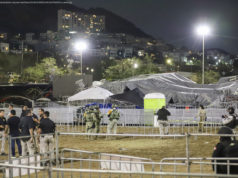We failed to take the steps required to win: among them, identifying an achievable end-state and defining the resources we are willing to expend.
With the defeat in Afghanistan coming at the end of a long line of self-inflicted catastrophes, America appears to be waking up to the notion that our foreign policy is disconnected from reality. As we watch our allies in the Northern Alliance flee the Panjshir valley and head into the mountains for a last-stand struggle against the Taliban – an enemy we spent thousands of lives and trillions of dollars fighting – it’s time for some much needed introspection. Those of us who served in America’s continuous stream of counterterrorism adventures and nation-building interventions have long been suspect of U.S. foreign policy. While busy with the daily dirty work of warfighting and dying, we could see the disconnect between the situation on the ground and the focus group–driven rhetoric of the generals and foreign policy establishment back home. It was like there were two worlds. Ours was noisy, bloody, and chaotic, encompassing a very real battle between good and evil. Theirs was diverse, inclusive, and superficially rational… composed almost entirely of PowerPoint fantasies reinforced by government stenographers posing as journalists. What began as a robust response to the deadly terrorist attacks on 9/11 was quickly redirected and emasculated by a ruling elite with their own agendas – none of which included the safety, sovereignty, or national security of our beloved America. At some point, the smart people in Washington D.C. decided that our Islamic extremist enemies were actually oppressed BIPOCs suffering under colonizing American commandos, and we were ordered to stop “brutalizing” them. This epiphany was unanimously recognized by our ruling elites through their lens of magical thinking, as Thaddeus McCotter described our foreign policy establishment’s disconnected reality in a superb essay. Yet the war machine could not be stopped. There was too much money to be made, laundered among the donor class of the military-industrial complex and nongovernmental organizations, and subsequently funneled into political donations for the uniparty. The war, the elites decided, just needed to be nicer, more diverse, and less lethal. Americans now need to ask the key question: How, exactly, did we lose an armed conflict to a 7 th -century religious cult? We failed to take several steps required to win an armed conflict: identifying an achievable end-state, defining the resources we are willing to expend, and considering the lengths we are willing to go to. First, before committing to armed conflict, a nation must identify an achievable and specific end-state. It must decide what success would look like. This kind of decision-making is done at the national level, by the president and his national security advisor, in consultation with the Cabinet-level national security principals and, in some situations, Congress. Next, as a nation, we need to establish what type and amount of resources we are willing to expend in pursuit of this end-state. These resources need to be roughly defined in terms of personnel, equipment, money, casualties, political capital, and reputation.






